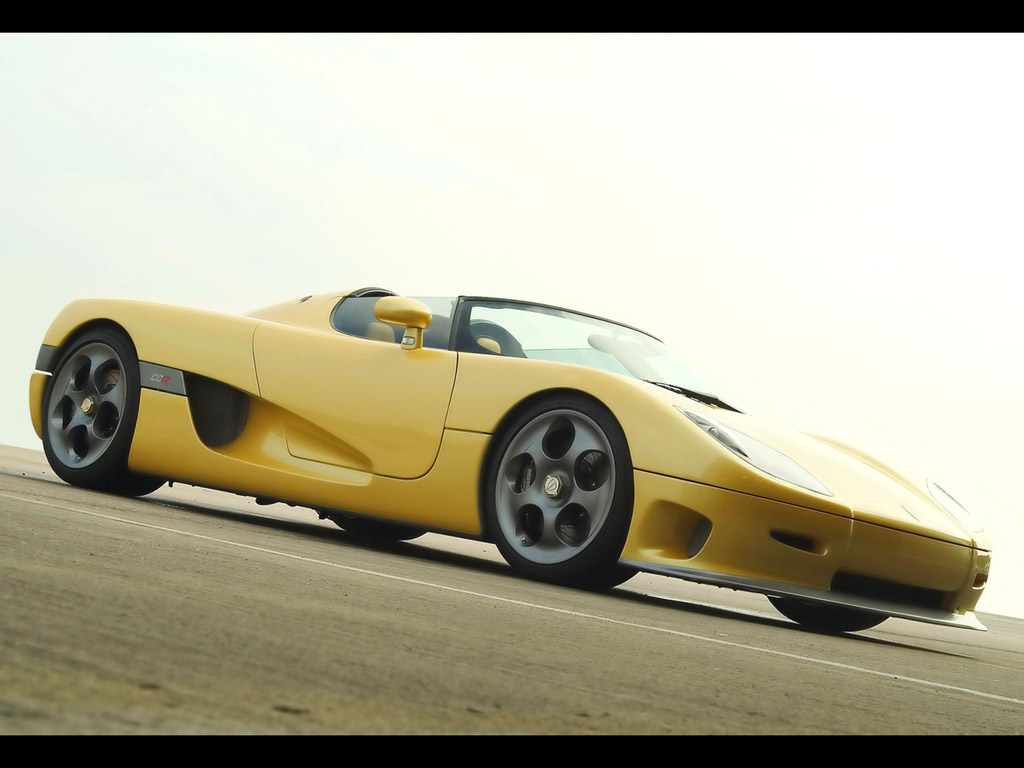2005 Koenigsegg CCR
|
Price |
-- |
Production |
-- | ||
|
Engine |
4.7 liter DOHC V8 |
Weight |
2601 lbs | ||
|
Aspiration |
dual superchargers |
Torque |
678 lb-ft @ 5700 rpm | ||
|
HP |
806 @ 6900 rpm |
HP/Weight |
3.2 lbs per hp | ||
|
HP/Liter |
171 hp per liter |
1/4 mile |
9 seconds @ 146 mph | ||
|
0-62 mph |
3.2 seconds |
Top Speed |
245 mph (estimate) |
(from Koenigsegg
Press Release) On February the 28th 2005, at 12.08 local
time, the Koenigsegg CCR broke the production road car speed record,
achieving a new official top speed of 388 (387.87) km/h at Italy’s
Nardo Prototipo proving ground.
A team of five Koenigsegg engineers and mechanics together with
founder Christian von Koenigsegg ran, a technically standard
Koenigsegg CCR in order to take the top speed record for productions
road cars. The famous supercar test driver, Loris Bicocchi who is a
veteran recorder breaker, drove the CCR.
The Koenigsegg CCR raised McLaren's previously unofficial mark of
372 km/h set at Nardo/Prototipo in 1993 with over 15 km/h. On top of
this the CCR broke the official McLaren F1 record of 386.7 km/h,
which was set on the 9 km straight line VW Ehra facility in
Wolfsburg Germany.
A team of Nardo Prototipo technicians independently verified the
speed of the CCR. The car was clocked using Tag Heuer´s Splitmaster
650 with photocells stationary at the track, recording the average
speed during 1 km.
Nardo Prototipo is a circular track with a circumference of 12.5 km.
This means that the car is driven in a constant turning motion,
which makes the exercise and speed even more impressive. The
steering wheel at this speed is kept at around 30 degrees of
constant angel, which equivalates to a sharp corner for the speed.
The constant turning motion of the car creates extra friction on the
tires. This extra friction overcomes the extra horsepower that was
needed for further acceleration. The maximum speed was reached at
around 6790 rpm, which is not equivalent to the maximum hp level,
which is at a higher rpm.
With this verification of speed, Christian von Koenigsegg is even
more confident that the Koenigsegg CCR is capable of reaching its
projected top speed of 395 km/h, or more, in a straight line.
Driver Loris Bicocchi was very impressed by the performance of the
car. He feels happy to finally prove the performance of the
Koenigsegg. “This test was very important for the customers and
owners of Koenigsegg cars. It proves that their belief and faith in
the small Koenigsegg Company was well founded”.
Filmator documented the record attempt. Filmator is a Swedish
filmcrew that currently is making a documentary about the Koenigsegg
Company for Swedish television.
The official Test Report is issued by Prototipo, acting as a third
party verificator and is forwarded to the Guinness Book of Records
for processing.
A pressconference will be held at 12:00 AM on Wednesday March 2nd
2005 at our Geneva Motor Show stand 2053.
Other interesting data from the Nardo test
Max temperatures (in
degree Celsius) during 40 seconds of full throttle:
Ambient temperature: 8, Tires: 64, Engine coolant: 91, Intake air
after intercooler: 64, Gearbox oil 94 degrees, Engine oil 112.
68 litre of fuel at the start of the test.
Car Set-up:
Standard road car fuel, Standard CCR Michelin tires, Standard ride
height of the car, standard engine configuration, standard wheel
geometries, standard gearbox, standard clutch, standard brakes,
standard over boost pressure from the superchargers.
Test safety equipment:
Roll cage, 4 point safety belts, Fire extinguisher system, logging
for data collection.
Comparison chart results at Nardo/Prototipo for Production cars:
1. Koenigsegg CCR 388 km/h
2. McLaren F1 372 km/h
3. Ferrari Enzo 355 km/h
4. Porsche Carrera GT 334 km/h
4. McLaren Mercedes SLR 334 km/h
5. Lamborghini Murcielago 330 km/h
Data was collected from Auto Motor & Sport, The official McLaren web
page and from Prototipo for the Koenigsegg data.



